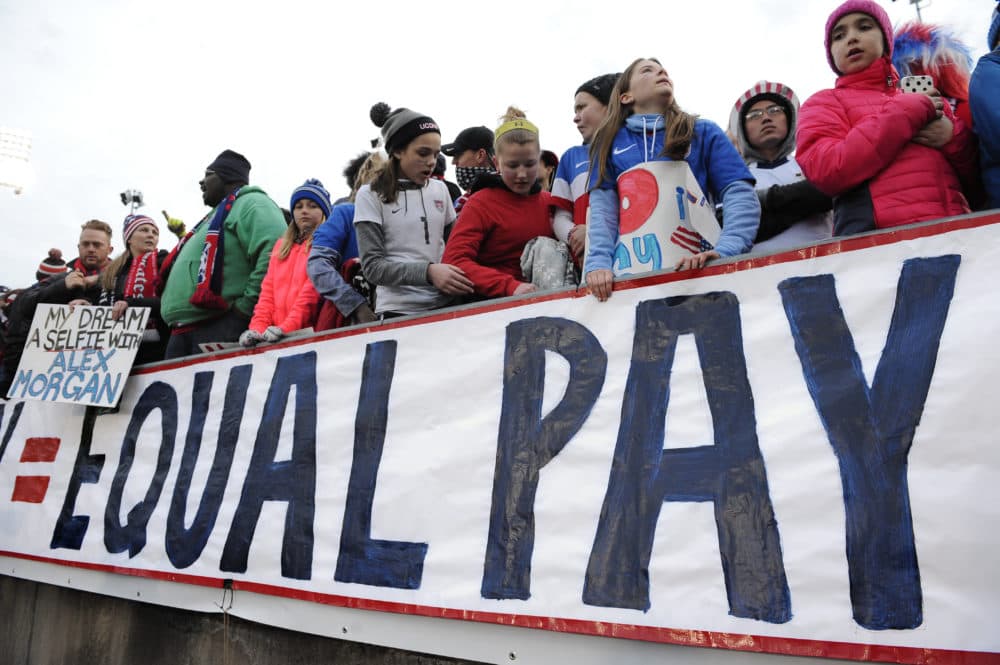Advertisement
Women Earn $.82 For Every Dollar A Man Earns. Here's How To Close The Wage Gap

Wednesday marks Equal Pay Day, which symbolizes how far into the year women need to work to earn what men earned in the previous year.
Women earn 82% of men's annual earnings on average, according to the U.S. Labor Department. The wage gap is even wider for Black and Latina women.
One of the most outspoken advocates for closing this wage gap is Lilly Ledbetter. She was at the center of the 2007 Supreme Court decision that barred her from suing Goodyear Tire & Rubber Company, which paid Ledbetter a fraction of what her male colleagues earned.
Ledbetter is now looking at the pandemic’s impact on working women, who have a higher unemployment rate than men. Nearly 3 million women have dropped out of the labor force in the past year.
In the beginning of 2020, women held more non-farm payroll jobs than men for just the second time in history. But those major economic gains have completely come undone, she says.
Many women she’s talked to have had to give up their careers to stay home and educate their kids during the pandemic, she says, with many struggling to put food on the table and keep up with rent.
And single mothers “struggled before this, but now it's doubly hard,” Ledbetter says.
Fatima Goss Graves, president and CEO of the National Women's Law Center, says Black and Latina women are shouldering the worst impacts of the pandemic and economic recession.
In 2019, Black women were paid 63% of what white men were paid, according to the Census Bureau, and the numbers show an even wider gap for Latina women. Because of this disparity, Black and Latina women didn’t have a buffer to weather the pandemic, Goss Graves says.
Women, especially Black and Latina women, are also disproportionately frontline workers, she explains.
Advertisement
“Two out of three frontline workers are women,” Goss Graves says. “But for Black women, one out of three who are working at all are working as frontline workers.”
Sectors that were hit the hardest, including hospitality and leisure, make up a large portion of jobs for women. Plus, “a care crisis” unfolded amid soaring job losses, Goss Graves says.
“Our care infrastructure crumbled and women bore the brunt of it,” she says.
To close the pay equality gap, Ledbetter says laws need to be enacted and strictly enforced.
When the Supreme Court ruled against her in Ledbetter v. Goodyear Tire & Rubber Co. in 2007, it was based on a technicality in the 1964 Civil Rights Act that limited discrimination claims to a 180-day period. She had exceeded that window of time.
Justice Ruth Bader Ginsburg’s powerful dissent in that case “changed my life,” Ledbetter says. Ginsburg wrote: “In our view, the court does not comprehend, or is indifferent to, the insidious way in which women can be victims of pay discrimination.”
Ledbetter had won her case in the lower courts just for it to be overturned in the Supreme Court, a devastating blow to her message that companies needed to do better, she says. But she says Ginsberg’s dissent reinforced that idea for her.
“It is critical that women are paid what they're rightfully earning because it's not only their support for their family today and tomorrow, but it's their retirement,” she says.
Under the Obama administration in 2009, Congress passed the Lilly Ledbetter Fair Pay Act with bipartisan support. Goss Graves helped draft that legislation, which became the first bill former President Barack Obama signed into law when he took office.
While the act didn’t fix pay inequalities, it narrowed the field a bit. There was “a real awakening” in 2009 to the realities of women in the workforce, Goss Graves says. Since then, dozens of states have changed their laws so workers can fight back against discrimination, she says.
Goss Graves has her sights set on the Paycheck Fairness Act, which hasn’t passed yet. She testified before Congress last week in support of the bill.
“The Paycheck Fairness Act would make pay more transparent. It allows people to talk about their wages. You can't be penalized if you want to talk about your pay,” she says.
The bill would also require employers to send pay analysis to the Equal Employment Opportunity Commission, an agency that enforces civil rights laws against workplace discrimination.
“That is important because employers typically aren't going to send information that has a problem to the EEOC. So it allows them to take a look and fix it, which is a thing too many employers aren't doing,” she says. “It changes the incentives so that employers hopefully will pay their employees correctly the first time.”
Since her case, Ledbetter has been steadfast in her advocacy for equal pay. Positive movement toward eradictating pay discrimination — from the Lilly Ledbetter Fair Pay Act to the Paycheck Fairness Act — keeps the 82 year old going.
The Alabama-native at one time thought the gender pay gaps was an issue plaguing the deep South, but she says she’s since discovered people are getting “short changed” across the globe.
“I've heard so many stories that will just break your heart where people do the work. They work long hours and they work hard. They may have worked 30 years, but yet they didn't get the pay,” she says. “And that's why I'm so passionate about it.”
Julia Corcoran produced and edited this interview for broadcast with Todd Mundt. Serena McMahon adapted it for the web.
This segment aired on March 24, 2021.

